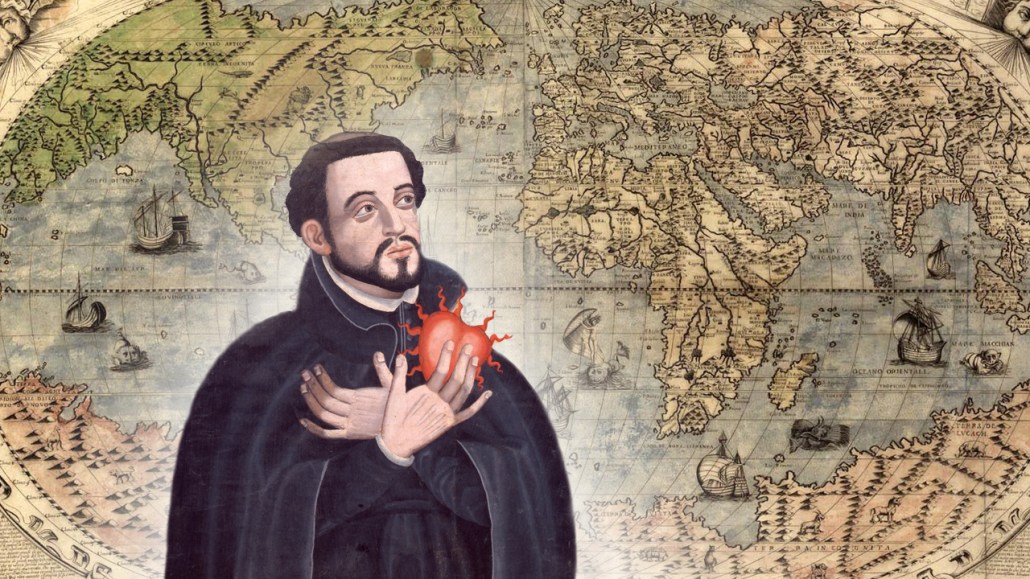Today, December 3, is the feast day of St. Francis Xavier, as well as the Day of Navarre and the Day of the Basque Language. This is all thanks to this Navarrese saint who was part of the first group of members of the Society of Jesus, the religious order founded by another Basque, St. Ignatius of Loyola.
St. Francis Xavier has not escaped the war of “national attributions” between Spain and France and the Basques. That’s why it’s far too easy to find biographies that claim he’s a “Spanish saint”. We deny that, and as we often repeat, to claim that he was Spanish is to offend the history of Navarre, his family, and himself.
It’s also far too easy articles online, written by people who call themselves Navarrese, to say it’s ridiculous to choose this day as the Day of the Basque Language because it is not true that he spoke Basque. These same pages then confirm that Navarre goes from “Vera de Bidasoa to the Ebro”, completely forgetting that Navarre extends to the other side of the Pyrenees and that someone from St-Jean-Pied-de-Port is just as Navarrese as someone from Tudela. What’s really going on is that they feel Spanish first and Navarrese second, and accept that Navarre was split in two. As they are Spaniards, what isn’t in Spain doesn’t belong to them.
In actual fact, however, St. Francis Xavier did speak Basque, and proof of that can be found in a letter he wrote in early 1544 from Cochin to his brothers in Europe. The original letter is now lost, but there are different transcriptions of what was written in it. The oldest of these copies, dated 1551 and located in Rome, in the Codex Romanus apographusf. 65. And in it, it states that the Saint claimed his tongue was “Biscayne”.
We should not be surprised by the use of this term to refer to Basque in the 16th century: at the time, “Basque”, “Biscayne”, and “Cantabrian” were all used as synonyms. Ignatius of Loyola, also Basque, when indicating his nationality at the Sorbonne, where he met Francis Xavier, wrote that he was cantaber. “Biscayne” and its derivatives can also be were also used back then, such as when a king in the Moluccas spoke in the Biscayne tongue.
The analysis of that letter and the conclusion reached were the work of a German, Georg Schurhammer S.J., in a 1929 article in the Revista internacional de Estudios Vascos. The publication, written in German, was translated and glossed in q951 by Navarrese José Aguerre; in the Revista Príncipe de Viana, year 18, issue 67-68, 1957, pp. 451-462.
In the text, we can also find an interesting analysis of the evolution of the language in the Kingdom of Navarre.
Both authors, the German and the Navarrese, deserve to be cited individually.
Of the German author’s work, José Goñi Gaztambide‘s recension of Schurhammer’s “Francisco Javier, su vida y su tiempo (1506·1552)” in Scripta Theologica 26 (1994/1) (also linked to below) is worth reading. The criticism that the Navarrese historian Ricardo García Villoslada, professor of Church History at the Gregorian University (Rome), makes of the first volume of the great work by the German Jesuit in 1958 caught our attention: after praising him for his scientific rigor, he accused Schurhammer of falsifying the image of Navarre, the Saint’s homeland, with his agramontismo and his Basque-ism.
Navarrese José Agerre Santesteban, author of the translation of Schurhammer’s article on the saint’s mother tongue and the accompanying gloss, is also not to the liking of the “Navarrese and Spanish” who defend that Francis Xavier did not speak Basque. After all, he was a Navarrese with a Basque Nationalist ideology. Moreover, he was named a member of the Royal Basque Language Academy, Euskaltzaindia for over thirty years, in addition to being the secretary of the Navarrese delegation at the Eusko Ikaskuntza — Society of Basque Studies and the director of several nationalist publications in Navarre. All that had extremely serious consequences during the Francoist coup and succeeding dictatorship.
For us, however, both the German and the Basque are two completely trustworthy sources. And, of course, there is also the matter of common sense, which tells us that Francisco de Jasso y Xabier, St. Francis Xavier, knew Basque, as did his whole family.
We’ll leave you with the .pdf files of the Schurhammer-Aguerre article “El habla materna de San Francisca Xavier” and Goñi Gaztambide‘s recension on the book “Francisco Javier, su vida y su tiempo (1506·1552)“.
Last Updated on Feb 8, 2021 by About Basque Country





